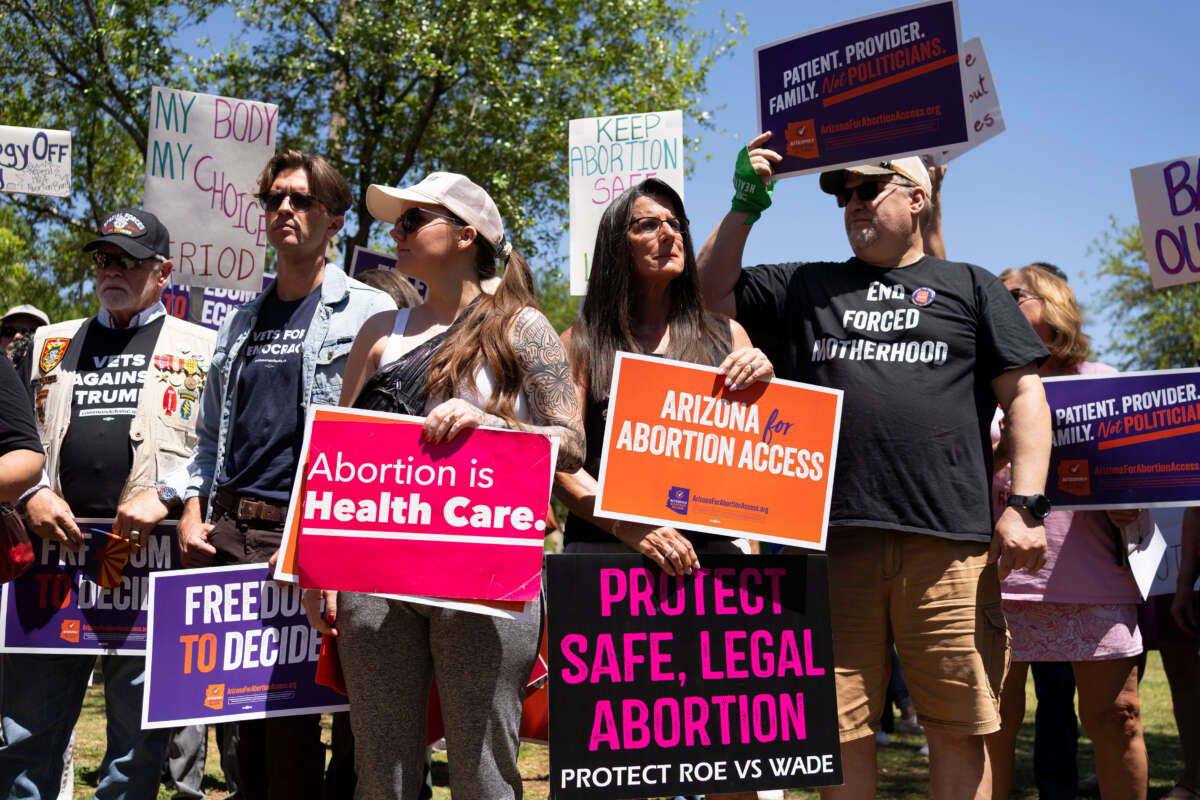The Arizona state House of Representatives has passed a repeal of the 1864 territorial-era statute that banned abortion in nearly every circumstance.
House Bill 2677 repeals the statute, which was re-implemented earlier this month by the state Supreme Court, whose conservative justices ruled that it was still in force absent federal protections for abortion that were ended when the federal Supreme Court overturned Roe v. Wade in 2022.
The law, which was passed nearly 50 years before Arizona became a state, forbids abortion at any stage of pregnancy. It makes no exceptions for rape or incest, and only allows the procedure in medical emergencies when a person’s life is at stake — a standard that, in practice, is often ignored due to doctors’ fears that they will be prosecuted.
If the repeal advances and becomes state law, a state statute that was in place during the Roe era would be enforced, allowing abortion up to 15 weeks of pregnancy in the state with numerous restrictions thereafter.
Multiple attempts to pass the repeal bill failed in the weeks after the State Supreme Court’s ruling due to a procedural block by Republicans, as House rules allow the Speaker, Rep. Ben Toma, to table such legislation when one or fewer members of his own party back a bill submitted by the minority party. But on Wednesday, two other Republicans, in addition to one who had already backed the repeal, joined with Democrats, forcing the vote and passing the bill.
The three Republicans who sided with Democrats were Reps. Matt Gress, Tim Dunn and Justin Wilmeth. The vast majority of Republicans in the State House conference — 28 in total — voted against the repeal, with some giving full endorsement to the 1864 statute.
Immediately after the vote, Toma took what appeared to be retributive actions against Democratic Leader Rep. Oscar De Los Santos, removing him from the powerful House Appropriations Committee and the House Rules Committee. Toma also removed Gress from the Appropriations Committee.
When asked why he took those actions, Toma simply responded, “Cause I’ve decided so.”
Democrats expressed outrage at the move, saying it was punitive rather than practical.
“This was a temper tantrum from the extreme right. It’s ridiculous,” said Rep. Nancy Gutierrez, the Democratic Whip, on the social media site X. “It’s completely unacceptable to remove anyone from committee with NO due process. This isn’t over.”
The measure now goes to the State Senate, which, due to scheduling issues, cannot take up the bill to repeal the abortion ban until May 1 at the earliest. Republicans have the majority in that chamber as well, and the bill would require at least two GOP senators to join with Democrats in order to pass.
“I am hopeful the Senate does the right thing and sends it to my desk so I can sign it,” Hobbs said in a statement.
Even if the bill is passed and Democratic Gov. Katie Hobbs signs it into law, it wouldn’t be enforced until 90 days after the current legislative session ends, which would still allow the 1864 statute to be enforced for at least a couple of months.
Abortion rights groups lauded the passage of the bill but noted that more protections were needed, as 15-week abortion bans are still dangerous and further restrictions would be in place.
Arizona for Abortion Access spokesperson Chris Love, whose group is organizing a constitutional ballot initiative for this November’s election, said passage of the bill wasn’t enough, and questioned the three Republicans’ motivations for siding with Democrats, suggesting they only did so for political reasons, not to protect reproductive health.
“Anti-abortion politicians in the Arizona Legislature are being dishonest. … They have no sincere intention of protecting abortion access here in Arizona,” Love said. “This move to repeal the 1864 ban is too little, too late.”
Planned Parenthood Advocates of Arizona CEO Angela Florez expressed similar feelings.
“Arizonans cannot stop fighting. Even with the repeal of the Civil War-era ban, the state will still have a ban on abortion after 15 weeks of pregnancy that denies people access to critical care,” Florez said.
The proposed constitutional amendment that voters will likely decide on this fall would ensure a “fundamental right to abortion” up to fetal viability — generally viewed to be around 22-25 weeks of pregnancy. It would provide additional protections for abortion access after that time period, including the right to obtain an abortion in cases of rape, incest, and in situations where a person’s life or health (physical or mental) is at severe risk, as determined by a “good faith” judgment by their health care providers.
Angry, shocked, overwhelmed? Take action: Support independent media.
We’ve borne witness to a chaotic first few months in Trump’s presidency.
Over the last months, each executive order has delivered shock and bewilderment — a core part of a strategy to make the right-wing turn feel inevitable and overwhelming. But, as organizer Sandra Avalos implored us to remember in Truthout last November, “Together, we are more powerful than Trump.”
Indeed, the Trump administration is pushing through executive orders, but — as we’ve reported at Truthout — many are in legal limbo and face court challenges from unions and civil rights groups. Efforts to quash anti-racist teaching and DEI programs are stalled by education faculty, staff, and students refusing to comply. And communities across the country are coming together to raise the alarm on ICE raids, inform neighbors of their civil rights, and protect each other in moving shows of solidarity.
It will be a long fight ahead. And as nonprofit movement media, Truthout plans to be there documenting and uplifting resistance.
As we undertake this life-sustaining work, we appeal for your support. We have 9 days left in our fundraiser: Please, if you find value in what we do, join our community of sustainers by making a monthly or one-time gift.
